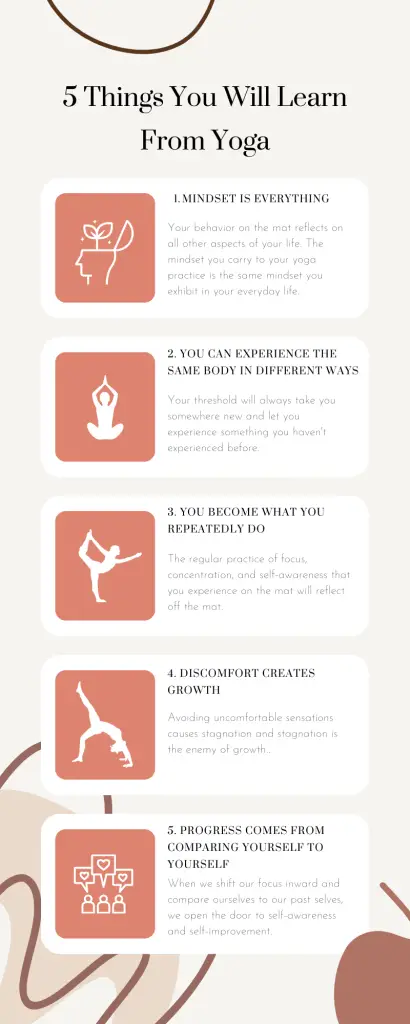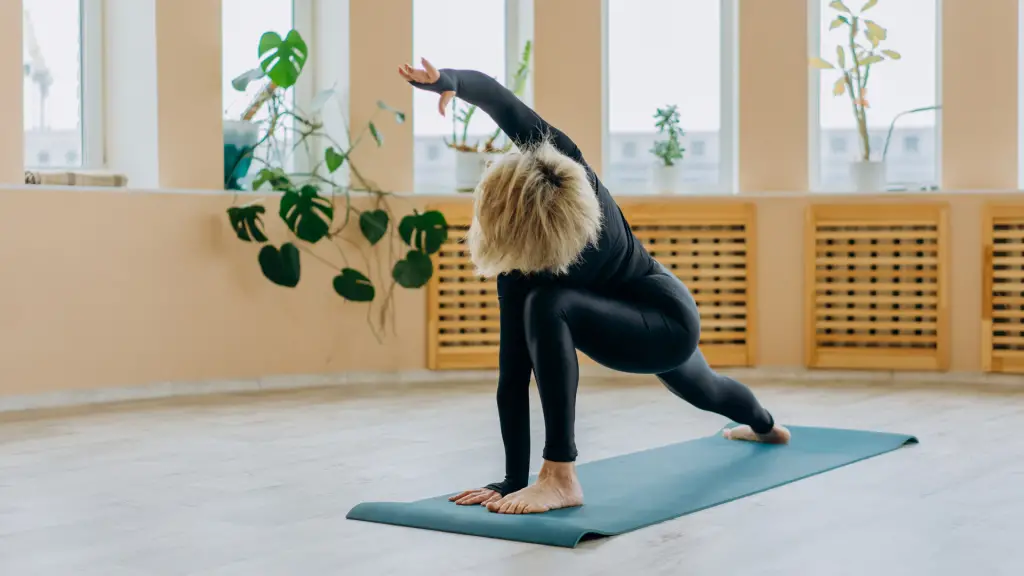The things you will learn from yoga are life lessons that will serve you on and off the mat. I stumbled on yoga at 43 because I wanted to define my waist with bodyweight core moves and learn the splits. I ended up gaining so much more!
The Things You Will Learn From Yoga
Life lessons from yoga are empowering and transformative. Yoga has the potential to change your life and your body.
1- Mindset Is Everything
Your behavior on the mat reflects on all other aspects of your life. The mindset you carry to your yoga practice is the same mindset you exhibit in your everyday life. You can learn a new mindset on the mat and bring it to your yoga practice and vice versa.

What Does Yoga Teach You Mentally
Yoga offers a variety of mental benefits that can positively impact your overall well-being. Here are some mental skills that yoga can teach:
- Mindfulness: Yoga emphasizes being fully present in the moment, observing your thoughts, sensations, and emotions without judgment. Through the practice of yoga, you can develop a greater awareness of your mental processes and learn to cultivate mindfulness in your everyday life. This awareness can help you manage stress, reduce anxiety, and enhance your overall mental clarity.
- Stress management: Yoga provides tools and techniques to manage stress effectively. By combining physical movement, breath control, and relaxation, yoga helps activate the body’s relaxation response and calm the nervous system. Regular practice of yoga can teach you how to reduce the impact of stress, cultivate resilience, and improve your ability to cope with challenging situations.
- Emotional balance: Yoga can teach you how to regulate your emotions and achieve a greater sense of emotional balance. Through the practice of yoga, you learn to observe and acknowledge your emotions without becoming overwhelmed or reactive. The combination of physical postures, breathwork, and meditation helps create a sense of inner calm and equanimity, enabling you to respond to emotional experiences with greater clarity and self-control.
- Focus and concentration: Yoga cultivates focus and concentration by encouraging you to direct your attention to your breath, body, or specific points of focus during the practice of asanas or meditation. Regularly training your mind to stay focused in the present moment can improve your concentration abilities in daily life, enhancing productivity and mental clarity.
- Self-awareness and self-acceptance: Yoga promotes self-awareness by encouraging you to tune in to your body, thoughts, and emotions during practice. This self-reflective process helps you develop a deeper understanding of yourself, your needs, and your limitations. Through this self-awareness, yoga teaches self-acceptance, encouraging you to embrace and honor yourself as you are, both physically and mentally.
- Cultivation of positive qualities: Yoga fosters the development of positive qualities such as compassion, gratitude, patience, and resilience. Through the practice of yoga, you can consciously work on cultivating these qualities within yourself, leading to a more positive and compassionate mindset.
It’s important to remember that these mental benefits are not instant or guaranteed with a single yoga session. Consistent practice over time, along with an open and receptive mindset, allows for the gradual integration of these mental lessons into your life.
Ready to get started? I created a 5-Day Yoga Habit Challenge to give you all the tools to create a yoga habit that is transformative without taking a lot of time.
2. You Can Experience the Same Body in Different Ways
As you practice yoga, you will learn to find your threshold. Your threshold is at the edge of your abilities, right where your practice is hard enough to make you think you want to stop, but you can push yourself a bit more to grow, get stronger, and be more flexible. Your threshold will always take you somewhere new and let you experience something you haven’t experienced before. As you learn to overcome, you start experiencing your body in new ways.
Yoga provides a unique opportunity to experience your body in new and profound ways. Through the practice of asanas (yoga postures), you become intimately aware of your body’s capabilities, limitations, and subtle sensations. Each pose invites you to explore your body’s alignment, balance, strength, and flexibility, fostering a deeper connection between mind and body. As you engage in conscious movement and breath, you begin to tap into the wisdom of your body, listening to its cues and responding with care and sensitivity. Yoga opens doors to sensations and movements that may have been overlooked or disregarded before, allowing you to witness the intricacies of your body’s intelligence. This newfound awareness extends beyond the yoga mat, permeating your daily life, and enabling you to make choices that honor and nourish your body, ultimately leading to a profound sense of embodiment and well-being.

3. You Become What You Repeatedly Do
As you create habits, like your yoga habit, you discover how your repetitive behaviors become second nature. In the context of yoga, the regular practice of focus, concentration, and self-awareness that you experience on the mat will reflect off the mat.
When we consistently engage in certain activities or behaviors, they become ingrained in our daily lives, influencing our thoughts, beliefs, and character over time. Whether it’s practicing a skill, adopting healthy habits, or embodying certain values, the choices we make and the actions we take consistently contribute to the development of our identity and shape our personal trajectory. By consciously cultivating positive and meaningful behaviors, we can actively steer ourselves toward the person we aspire to be, fostering growth, personal development, and the realization of our fullest potential. Yoga has the potential to transform who you are (learn more from my 1-Year Yoga Transformation).

Want to learn this? (check out my Yoga Side Plank Pose (Vasisthasana) Vinyasa Flow.
4. Discomfort Creates Growth
Avoiding uncomfortable sensations causes stagnation and stagnation is the enemy of growth. In yoga, I have learned to push myself just enough.
Discomfort, though often challenging and unwelcome, has the remarkable ability to foster personal growth and development. When we step out of our comfort zones and face situations that push our boundaries, we encounter new experiences, perspectives, and opportunities for learning. It is in these moments of discomfort that we are prompted to adapt, innovate, and evolve. By embracing discomfort, we challenge ourselves to overcome obstacles, confront fears, and expand our capabilities. Through this process, we gain resilience, confidence, and a deeper understanding of our own strengths and potential. Discomfort serves as a catalyst for growth, propelling us forward on a transformative journey that leads to self-discovery, enhanced skills, and a greater sense of fulfillment.
5. Progress Comes From Comparing Yourself to Yourself
Too often, we compare ourselves with others. It can make us feel inadequate or superior. Both these feelings can stunt our growth. If we feel inadequate, we may decide that we can’t do it, it’s too hard, and we don’t have that type of potential. If we feel superior, we don’t see the need for growth because we are so much better. Avoid the trap of comparison.
When we shift our focus inward and compare ourselves to our past selves, we open the door to self-awareness and self-improvement. By evaluating our own progress, setting realistic goals, and measuring our achievements against our own benchmarks, we can witness the evolution of our abilities, skills, and character. This introspective approach fosters a sense of empowerment, self-compassion, and personal fulfillment, as we recognize and appreciate the growth we have achieved on our individual journey.
Benefits of Yoga
Aside from the ways yoga helps you learn in your body and in life, they are other reasons why we should do yoga. Yoga offers a wide range of physical, mental, and emotional benefits. Here are some of the key benefits associated with regular yoga practice:
- Physical strength and flexibility: Yoga involves various postures (asanas) that target different muscle groups, promoting strength, flexibility, and improved overall physical fitness. It can help improve balance, coordination, and posture, while also enhancing muscle tone and endurance. (You may enjoy Best Yoga for Mobility: Strength and Flexibility Flow and 5 Effective Yoga Poses for Strength and Flexibility).
- Stress reduction and relaxation: Yoga incorporates breathing exercises (pranayama) and relaxation techniques that activate the parasympathetic nervous system, promoting relaxation and reducing stress. Regular practice can help manage anxiety, improve sleep quality, and increase overall feelings of calm and well-being.
- Increased body awareness and mindfulness: Yoga encourages mindful movement, bringing awareness to the present moment, and fostering a deeper connection between the mind and body. This heightened body awareness can help identify and address physical imbalances, reduce the risk of injuries, and enhance overall physical and mental well-being.
- Improved mental clarity and focus: Through the combination of physical postures, breathwork, and meditation, yoga can enhance mental clarity, concentration, and focus. It helps calm the mind, reduce mental chatter, and improve cognitive function, ultimately leading to improved productivity and performance in daily life.
- Enhanced flexibility and joint health: Regular practice of yoga can improve flexibility and joint range of motion, leading to greater mobility and reducing the risk of injuries. It helps lengthen and strengthen muscles, maintain joint health, and improve overall body flexibility.
- Better cardiovascular health: Some forms of yoga, such as Vinyasa or Power Yoga, incorporate dynamic movements that increase heart rate and provide a cardiovascular workout. This can improve cardiovascular endurance, promote healthy blood circulation, and contribute to heart health.
- Emotional well-being and self-awareness: Yoga practice often includes elements of self-reflection, meditation, and cultivating positive emotions. It can help manage and regulate emotions, reduce symptoms of depression and anxiety, and promote a sense of overall emotional well-being.
- Improved respiratory function: Yoga places emphasis on deep, mindful breathing techniques, which can enhance lung capacity, strengthen respiratory muscles, and improve overall respiratory function. This can be particularly beneficial for individuals with respiratory conditions such as asthma.
- Enhanced immune system function: Studies have suggested that regular yoga practice may have a positive impact on the immune system, helping to strengthen its function and improve overall immune response.
It’s important to note that the specific benefits of yoga can vary from person to person, and consistency and regular practice are key to experiencing these benefits.
In Summary
The things you will learn from yoga might differ from what I learned from yoga, of course! That’s one of the aspects I love most about yoga! It is so multifaceted! You will never stop growing and learning from this practice.





